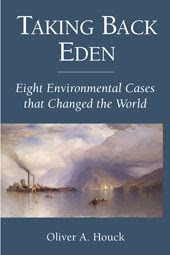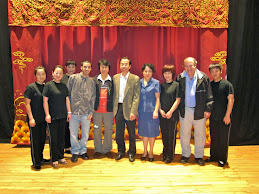Below is the blog post I made on June 21, but was unable to post while in China where Blogspot is blocked:
Last week I toured the Xinjiang Uyghur Autonomous Region in far western China. It has been the site of considerable unrest leading to a heavy police and army presence and the absence of foreign tourists. On Monday morning I flew from Beijing to Ürümqi, a four-hour flight. Because China maintains a single time zone for the entire country, the sun comes up a couple of hours later in Xinjiang than it does in Beijing. On Monday afternoon I visited Heavenly Lake in the mountains southeast of Urumqi where I took a nice hike. On Tuesday I visited the ancient city of Turpan, 100 miles southeast of Urumqi. On the way to Turpan I passed through two massive wind farms, one extending for 12 miles and another for 22 miles. They are located on two plains separated by the Tianshan Mountains where strong, sustained winds blow. The strength of the winds was illustrated by the sight of a crane trying to right a motor home that had been blown off the road. The wind farms had turbines almost as far as the eye could see and they provide enough electricity to power Ürümqi, a town of 3 million people.
Turpan is located in the desert along the Turpan Depression, the fourth lowest spot on earth more than 500 feet below sea level. It is one of the hottest and driest places on the planet. The day before I arrived the temperature had reached 108 degrees. I had the good fortune of being there during a rare rainstorm, which my guide explained would probably be one of only two days all year in which sustained rain fell. I toured the remarkable ancient Karez (Uyghur word for well) irrigation system that brings water from melting mountain glaciers to Turpan through a series of underground canals that date from the Han Dynasty. Tourists are allowed to climb underground to view the canals, which have allowed Turpan to become a grape-growing oasis. As the glaciers in the mountains recede due to climate change, parts of the 3,000-mile network of canals have begun drying up. While in Turpan I also visited the amazing ruins of the ancient Yar City (Jiaohe) and the Mutuo Valley, a gorge in the Flaming Mountains.
On Wednesday I returned to Ürümqi where I visited the Xinjiang International Grand Bazaar, one of the world’s largest. I got a great view of the city from the top of the tower located in the center of the bazaar. Following a wonderful kebab lunch I visited the Xinjiang Regional Museum. On display there is the famous Loulan Beauty, a 3,800-year old mummified corpse. The Loulan Beauty is believed to have died while in her early 40s, probably due to lung disease caused by sand in the air and pollution from open fires. On Thursday I flew back to Beijing where I encountered a massive traffic jam that made the trip from the airport to downtown take more than two hours. For a total of eighteen minutes all traffic on Chang’an Avenue, downtown Beijing’s main thoroughfare, came to a complete stop as far as the eye could see. After about ten minutes of terminal gridlock people started getting out of their vehicles and taking photos or lighting up cigarettes. On Friday I flew to Shanghai where I will be all next week. I will post photos of my trip in the Photo Albums section of this website.
On Thursday June 18 the Vatican officially released Pope Francis’s long-anticipated encyclical on the environment. Entitled
Laudato Si (Praise Be to You) On Care for Our Common Home, the encyclical was published in eight languages. A copy in English
is available online at: http://w2.vatican.va/content/francesco/en/encyclicals/documents/papa-francesco_20150524_enciclica-laudato-si.html. When he was selected Pope two years ago, Argentine archbishop Jorge Mario Bergoglio chose the name Francis to honor St. Francis of Assisi, “the patron saint of all who study and work in the area of ecology.” The encyclical reviews the history of the Catholic Church’s concern for the environment, noting Pope John XXIII’s concern over the testing of nuclear weapons in 1963, Pope Paul IV’s condemnation of environmental degradation in 1971, and statements of environmental concern by their successors. Declaring that God has entrusted the world to humans, Pope Francis states that nature is misused when it is viewed as property we use for ourselves alone. He notes that many religious traditions properly view activity that harms the environment as a sin. The Pope urgently appeals “for a new dialogue about how we are shaping the future of our planet.”
The encyclical presents a solid discussion of the causes and consequences of climate change and it stresses the importance of shifting away from highly polluting fossil fuel energy sources to renewable energy, something that has caused great distress to the fossil fuel industry and the climate deniers it promotes. It stresses that access to safe drinking water should be considered a fundamental human right and it strongly emphasizes the importance of protecting wetlands and preserving biodiversity. Importantly, the encyclical declares that the biblical reference in the book of Genesis to man having “dominion” over the earth has been incorrectly interpreted to permit unbridled development (“the Bible has no place for a tyrannical anthropocentrism unconcerned for other creatures”). Rather, it argues that “our ‘dominion’ over the universe should be understood more properly in the sense of responsible stewardship” and that the right to private property is “not inviolable,” but rather subject to a “social mortgage.”
The gist of Laudato Si is that mankind has a strong moral obligation to protect the environment that has not been honored despite repeated global environmental summits. As a result we face an “ecological crisis” that particularly harms the poorest and most vulnerable. We must pursue intergenerational equity and hear “both the cry of the earth and the cry of the poor” (emphasis in original). The encyclical emphasizes “how everything is interconnected” and that various factors such as loss of freedom, violence and corruption can undermine the effectiveness of legal institutions (“Laws may be well framed yet remain a dead letter. Can we hope, then, that in such cases, legislation and regulations dealing with the environment will really prove effective?”). Laudato Si praises the Montreal Protocol, the Basel Convention, and the Convention on International Trade in Endangered Species (CITES). It endorses the precautionary principle and applauds the1992 Rio Declaration, but decries the scant development of global environmental norms since then.
Significantly, Pope Francis stresses the importance of developing effective national environmental laws and regulations (“Society, through non-governmental organizations and intermediate groups, must put pressure on governments to develop more rigorous regulations, procedures and controls. Unless citizens control political power – national, regional and municipal – it will not be possible to control damage to the environment.”). He also notes the importance of continuity (“policies related to climate change and environmental protection cannot be altered with every change of government. Results take time and demand immediate outlays which may not produce tangible effects within any one government’s term. That is why, in the absence of pressure from the public and from civic institutions, political authorities will always be reluctant to intervene, all the more when urgent needs must be met. To take up these responsibilities and the costs they entail, politicians will inevitably clash with the mindset of short-term gain and results which dominates present-day economics and politics.”). Pope Francis argues that laws, even when enforceable, will not alone bring about the necessary changes without ecological education that motivates individuals to change their behavior.
While Pope Francis has received high praise for Laudato Si, some parts of it have caused controversy even within the environmental community. He criticizes carbon trading as a possible “ploy which permits maintaining the excessive consumption of some countries”. This led one prominent environmental economist to denounce Pope Francis as a representative of the views of “a small set of socialist Latin American countries that are opposed to the world economic order [and] fearful of free markets.” The Pope does argue that market forces cannot adequately protect the environment and he identifies “the increasing use and power of air-conditioning” as an example of “harmful consumption.” He criticizes those who blame environmental degradation on population growth in developing countries and asserts that an “ecological debt” is owed by the “global north” to the “global south.” He argues for “redefining our notion of progress,” noting that “technological and economic development which does not leave in its wake a better world and an integrally higher quality of life cannot be considered progress.” Pope Francis astutely observes that the term “sustainable growth” often is used as “a way of distracting attention and offering excuses” reducing “the social and environmental responsibility of businesses . . . to a series of marketing and image-enhancing measures.”
Pope Francis will be visiting the U.S. in September. His trip will include a visit to the United Nations and an address before a joint session of the U.S. Congress. Given the encyclical’s urgent message concerning the importance of a strong, new global climate treaty, opponents of measures to control greenhouse gas (GHG) emissions are struggling to come up with responses to it. Particularly amusing have been suggestions that religion should be kept out of politics or observations that the Pope is not a scientist by the very political figures who in the past have used religion for political aims and who refuse to accept the scientific consensus on climate change. While the full impact of the Pope’s environmental crusade is not known yet, it seems to have improved the chances that a good, new global agreement on measures to combat climate change will be adopted at the Paris COP in December.
Last week the Japanese government announced that it plans to resume whaling in Antarctica later this year. Japan suspended whaling after the International Court of Justice (ICJ) rejected its claim that Japan’s whaling fit within the research exception to the International Whaling Commission’s ban on commercial whaling. An IWC expert panel said it was unable to endorse Japan’s revised plan to kill 333 minke whales each year between 2015 and 2027, approximately one-third of its previous catch.
Last week the U.S. Environmental Protection Agency (EPA) proposed to require that heavy trucks improve their fuel economy on average by 40 percent by the year 2027. The proposal is part of the Obama administration’s plans to reduce U.S. GHG emissions. While it is estimated that compliance with the rules could increase the cost of trucks by $12,000-14,000 per vehicle, the added expense is expected to be recouped quickly in fuel savings. Truck manufacturer Cummins actually expressed support for the new regulations, though trucking companies were more skeptical.
Today I met with a Chinese lawyers who is involved in the new wave of public interest litigation brought in response to recent changes in China’s environmental laws. While the jury is still out, there is considerable excitement in the legal community here in anticipation that Chinese courts will become more receptive to environmental cases.
















